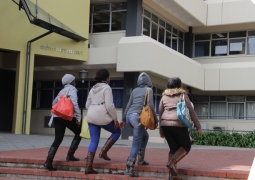
Parliament, Wednesday, 2 September 2020 – The Portfolio Committee on Basic Education heard from the briefing it received from the Department of Basic Education yesterday that grade 12 learners who write examinations in April or May in 2021 will be able to enrol at universities that finish their 2020 academic programmes in 2021.
According to the department, only five universities will reopen at the traditional reopening time in 2021. The remainder, particularly historically disadvantaged institutions, will reopen the 2021 year after finishing their 2020 academic programmes. The department said that this will assist in accommodating grade 12 learners who will write their exams after March 2021. The Director-General of the Department, Mr Matanzima Mweli, said: “It is only the five historically advantaged universities that are going to finish in November 2020. The rest will finish in 2021.”
The department briefed the committee on, among other things, the state of reopening of schools, the National School Nutrition Programme and Draft Directions for Learners with Special Education Needs (LSEN).
The department also briefed the committee on current and projected dropouts. On current dropouts, the committee heard that these are more prevalent in affluent provinces, such as the Western Cape, than in rural provinces. One of the reasons for this, the department said, is parents’ choice to send their children to school or not.
The Chairperson of the committee, Ms Bongiwe Mbinqo-Gigaba, urged the department to ensure that learners, especially from poor families, are encouraged to return to school. “There must be a concerted effort to ensure that these learners are in class, as the majority of them don’t have access to an online learning mode. No teacher in front of them means no education for them,” she said.
The committee also heard that adherence to lockdown and hygiene protocols means that few learners are in class. Ms Mbinqo-Gigaba asked the department about the possibility of continuing with fewer learners per teacher beyond Covid-19, which would improve the quality of education. She also asked what plan the department has in place for future crises. In response, the department said there is a plan in place.
On the question of the assessment of learners, particularly those in grade 12, the department told the committee that it is working on alternatives to the tradition methods of examinations and tests, such as project-based assessments.
On online learning, the department told the committee about the advantages and disadvantages of online learning. One disadvantage, is that online learning does not provide social, emotional and supervisory support that learners need. One positive, however, is that online learning makes it possible for more learners to benefit from a good teacher.
On school nutrition, Ms Mbinqo-Gigaba asked the department about the role of school gardens, especially in rural schools. “When we were learners, we were encouraged by our teachers to plough school gardens for both academic learning and for the provision of food for nutrition purposes,” she added.
On school gardens, Mr Mweli said, school garden is a responsibility of the school principal and the School Governing Body. On questions that required statistical responses, the department was asked to provide written responses and send them to the committee.
ISSUED BY THE PARLIAMENTARY COMMUNICATION SERVICES ON BEHALF OF THE CHAIRPERSON OF THE PORTFOLIO COMMITTEE ON BASIC EDUCATION, MS BONGIWE MBINQO-GIGABA.
For media enquiries or interviews with the Chairperson, please contact the committee’s Media Officer:
Name: Rajaa Azzakani (Ms)
Tel: 021 403 8437
Cell: 081 703 9542
E-mail: razzakani@parliament.gov.za

